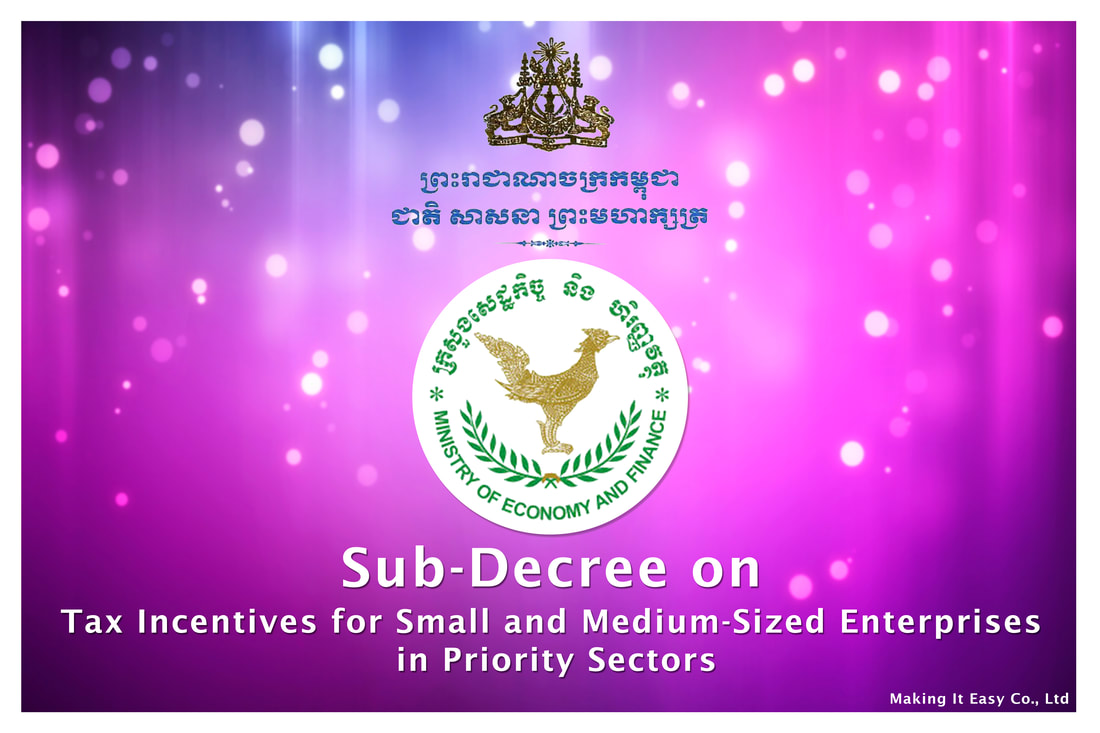To find out more about the tax incentives being offered, refer to the definitions and information below.
What qualifies as an SME? Use the following definitions of SMEs.
"Small-sized Enterprises” refers to any business that has an annual revenue turnover of 250 million Riel to 700 million Riel ($62,500 to $175,000 USD), or an enterprise that is categorized as a small taxpayer according to the laws and regulations or has 10-50 employees.
“Medium-sized Enterprises” refers to any business that has an annual revenue turnover of 700 million Riel to 4 billion Riel ($175,000 to $1,000,000 USD), or an enterprise that is categorized as a medium taxpayer according to the laws and regulations or has 51-100 employees.
Step 2: Priority Sector
Does your SME fit into one of these priority sectors? In order to qualify, the nature of your business must be categorized in one of the following sectors.
1. Agricultural products or agro-processing
2. Food production and processing
3. Manufacturing of goods for domestic consumption, waste processing, and goods for the tourism sector
4. Manufacturing of final goods, parts or components to support other manufacturing
5. Research and development of information technology including the supply of innovative information management services
6. Enterprises in the SME clusters, and enterprises that develop those clusters
However, it is important to note that SMEs that affect social security, health, and the environment are not eligible for these incentives.
Tax Incentives: Tax on Income (TOI) Exemptions and Deductible Expenses
SMEs that qualify according to the specifications stated above are entitled to the following:
- 3 years of TOI exemption. Or 5 years of TOI exemption, if the SME meets one of the following conditions:
- Using at least 60% of local content
- Increasing at least 20% of workforce
- Located in SME Clusters.
- Exempt from prepayment of TOI & minimum tax during the 3-year or 5-year TOI exemption period
- Deductible expenses of the following:
- 200% deduction for expenses on information system account booking
- 200% deduction for expenses on employee training in the areas of account booking and other technical skills
- 150% deduction for expenses on purchases of machines and other innovative high-tech equipment that serve the purpose of production productivity
Conditions
It is important to note that even if you qualify for the incentives listed above, you still must “hold the accounting books” and file tax returns on TOI with the Tax administration by the due date and in accordance with the laws and regulations. If you fail to comply with tax obligations stated in the laws and regulations, then you forfeit your rights to these incentives will be revoked.
Any statement that goes against this sub-degree is null and will be repealed.
This sub-decree is now in effect. And as of 02 October 2018, the Minister in charge of the Council of Ministers, the Minister of Economy and Finance, and all relevant ministers and all head of institutions shall be responsible for implementing this sub-decree according to their respective duties.
______________________________________________________________________________
References made in the sub-decree
Having seen the following:
- Constitution of the Kingdom of Cambodia
- Royal Decree NS/RKT/0918/925, dated September 06, 2018 on the Appointment of the Royal Government of Cambodia;
- Royal Code NS/RKM/0618/012, dated June 28, 2018 on the Promulgation of the Law on the Organization and Function of the Council of Ministers;
- Royal Code NS/RKM/0196/18, dated January 24, 1996 on the Promulgation of the Law on the Establishment of the Ministry of Economy and Finance;
- Royal Code NS/RKM/0508/016, dated May 13, 2008 on the Promulgation of the Law on Public Financial System;
- Royal Code NS/RKM/0297/03, dated February 24, 1997 on the Promulgation of the Law on Taxation;
- Royal Code NS/RKM/0303/010, dated March 31, 2003 on the Promulgation of the Law on Amendment of Law on Taxation
- Royal Decree NS/RKM/1213/1444, dated December 31, 2013 on theEstablishment of the Economic and Finance Policy Committee;
- Sub-decree 75 OrNKr. BK, dated May 25, 2017 on the Amendment of the Sub-decree 488 OrNKr. BK dated October 16, 2013 on the Organization and Function of the Ministry of Economy and Finance;
- Sub-decree 488 OrNKr. BK, dated October 16, 2013 on the Organization and Function of the Ministry of Economy and Finance;
- Sub-decree 17 OrNKr. BK, dated February 07, 2017 on the Tax Incentives for
| Khmer original Sub-Decree on SME Tax Incentives |


 RSS Feed
RSS Feed